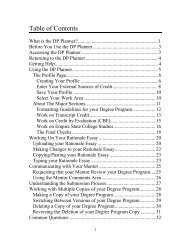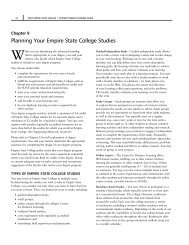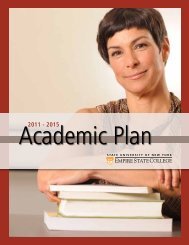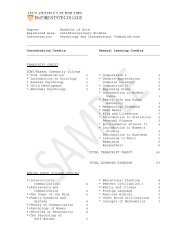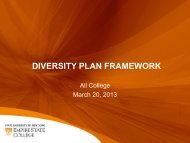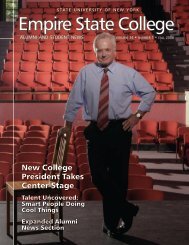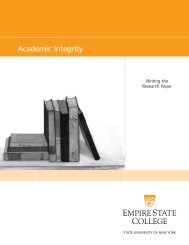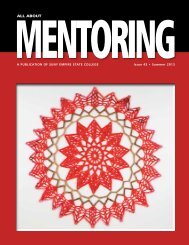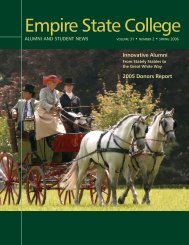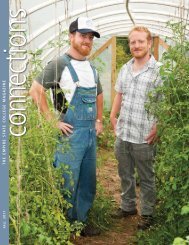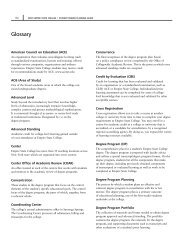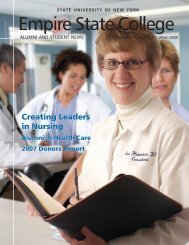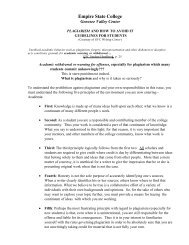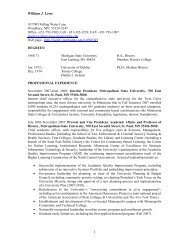All About Mentoring Spring 2011 - SUNY Empire State College
All About Mentoring Spring 2011 - SUNY Empire State College
All About Mentoring Spring 2011 - SUNY Empire State College
You also want an ePaper? Increase the reach of your titles
YUMPU automatically turns print PDFs into web optimized ePapers that Google loves.
11<br />
<strong>Mentoring</strong>: A Poet’s View<br />
Susan Jefts, Center for Distance Learning<br />
Maybe it all comes down to poetry<br />
versus prose. The whispered<br />
or the spoken, the implied or<br />
the stated. The more subtle light of evening<br />
versus the bright light of day. It’s hard to<br />
live solidly in both worlds. I think most of<br />
us have a preference for one or the other. Is<br />
it the difference between intuitive ways of<br />
perceiving and the more sensing, meaning<br />
via the five senses, way of perceiving<br />
Sometimes it seems to be. Multitudes of<br />
colors, dimensions and possibilities versus<br />
the observable ones before us or known<br />
in our minds. “I dwell in possibilities,”<br />
Emily Dickinson said of poetry, “a fairer<br />
house than prose.” This is not to say that<br />
prose isn’t colorful and full of dimension<br />
and possibility – it often is. But poetry is<br />
unique in possessing that quality Octavio<br />
Paz calls “roots and wings.” It likes to fly to<br />
unchartered places, as well as dwell in the<br />
deep rootedness of the earth. It needs both,<br />
and can have both, even in the same line.<br />
But is it an and/or thing we’re talking<br />
about Don’t we have the capacity for both<br />
poetry and prose in our lives and the way<br />
we see And isn’t there a need for both in<br />
this world There are days when I just want<br />
to go in a straight line. I have a list and I<br />
want to get it all done. If I stopped for every<br />
stray atom or metaphor that wandered<br />
into my mind, the day would be shot. No<br />
meetings attended, nothing mailed, no calls<br />
returned. I’d be a happy and creative, but<br />
disorganized, mess. Some days I need the<br />
set parameters and completion of prose.<br />
Point A to point B with just a few detours.<br />
I can go like this for a while, maybe even a<br />
week or two, but then something happens. I<br />
start to miss the subtleties and uncertainties<br />
of life, and the turning of them into<br />
something – something of captured beauty,<br />
and not necessarily with purpose. It starts in<br />
unlikely settings: a meeting at work, a call<br />
from a student, or an exchange of money<br />
at the coffee shop. I become aware that<br />
something is missing in these exchanges and<br />
if I stop for a moment, can sometimes find it<br />
dwelling between words, or in the patterns<br />
of light and shadow across a counter. It is<br />
the rest of the story, the unsaid words. It is<br />
where poetry tends to live.<br />
It occurs to me that mentoring is a little like<br />
this. So much of it is about how we choose<br />
to see. It can help to know if our natural<br />
way of seeing is by way of possibilities and<br />
associations or in more of a sensing manner<br />
of considering what is already there before<br />
us, and of what seems to make “sense.”<br />
Our culture has us trained to perceive in<br />
more of a practical and logical manner,<br />
whatever our natural preference, and this<br />
can leave out a whole world of possibilities.<br />
What I believe we (and our students) could<br />
benefit from when mentoring, is a conscious<br />
turning to the intuitive, associative parts of<br />
our minds, where we might dwell a little<br />
more in possibility.<br />
It is relatively easy, in many cases, to guide<br />
students along toward developing degree<br />
plans with a minimal amount of deep<br />
reflection on either of our parts. I find<br />
that when I stop, however, even just for<br />
a few minutes, and look at a degree plan<br />
backward or forward or a bit upside down,<br />
it can take on a new light. Often the clues<br />
have been there all along. Something a<br />
student once said in email, or a recurring<br />
word or phrase. Often they are the asides.<br />
They don’t find their way to the center<br />
because they seem unrelated at first, perhaps<br />
illogical. This tends to be where the gems lie;<br />
in the odd juxtaposition of words or ideas<br />
that can lead to the most interesting and<br />
original places.<br />
I have been working with a student<br />
who started with a concentration title of<br />
philosophy, but during her first few months<br />
as a student at the Center for Distance<br />
Learning, she occasionally mentioned her<br />
interests in human services and writing.<br />
From time to time, I would ask her how<br />
she saw her concentration in philosophy<br />
Susan Jefts<br />
developing, but she was never sure. One day<br />
I decided to play with this, toss back to her<br />
some of her own words and thoughts that<br />
included her interests in journalism, human<br />
services and philosophy. She had especially<br />
liked a philosophy class where they talked<br />
about how there are no absolute truths.<br />
We spent the next week emailing back and<br />
forth about this idea and aspects of her three<br />
interest areas. We explored what about them<br />
she was drawn to and how writing relates<br />
to philosophy, and how writing relates to<br />
mental health and community services. Then<br />
we progressed to considering different ways<br />
of combining some of these areas.<br />
She said that from this process of exchanges<br />
she felt a whole new world of possibilities<br />
open up for her. She had not considered<br />
that there might be meaningful connections<br />
between her different interests. I suggested<br />
she read about the area of interdisciplinary<br />
studies that could help her translate these<br />
connections into a viable academic program.<br />
Over the next days, she shared a multitude<br />
of possible ideas, and of subpossibilities<br />
within them, things I would not have<br />
thought of.<br />
suny empire state college • all about mentoring • issue 39 • spring <strong>2011</strong>



